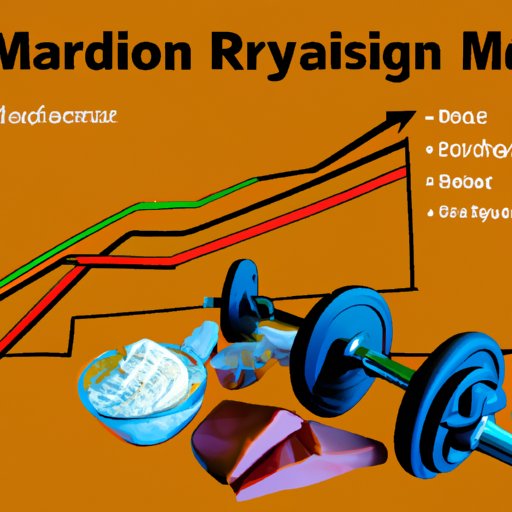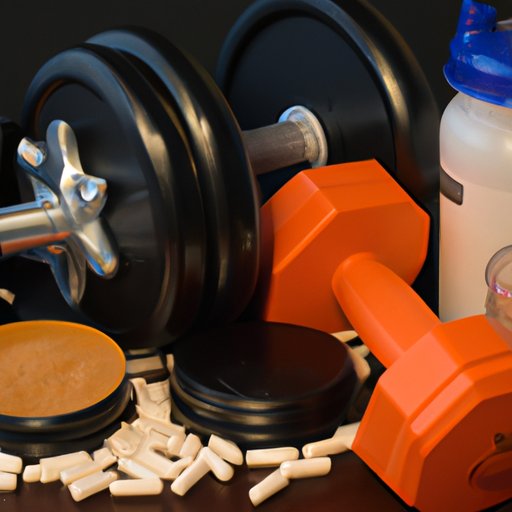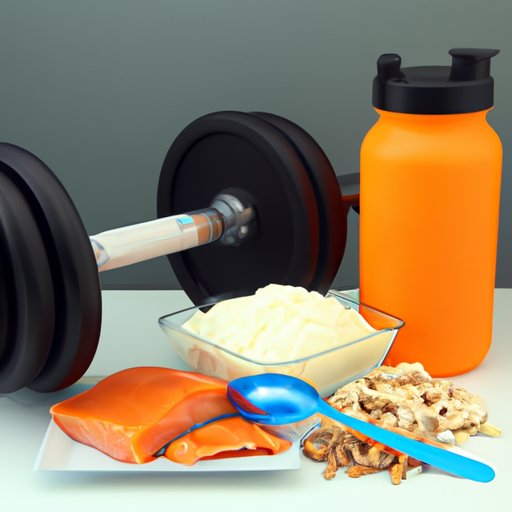Introduction
Gaining muscle is a goal shared by many people who are looking to become stronger, leaner, and fitter. Building muscle requires dedication, consistency, and an understanding of how nutrition can support muscle growth. In order to effectively build muscle, it’s important to understand how much you should eat, as well as the types of food that will best support your goals.
Definition of Muscle Gain
Muscle gain, also known as muscle hypertrophy, is the process of increasing muscle size and strength through exercise and nutrition. Muscle hypertrophy is the result of increased protein synthesis, which is triggered by resistance training and adequate nutrient intake. Resistance training involves lifting weights or using body weight exercises to create tension on the muscles. This tension stimulates the muscles to grow in size and strength.

Overview of the Importance of Diet When Trying to Build Muscle
When trying to build muscle, nutrition is just as important as exercise. Eating the right amount of calories and macronutrients (protein, carbohydrates, and fats) is essential for muscle growth. By providing the body with enough energy and nutrients, it can build muscle efficiently and effectively.
Calculating Calorie Intake for Muscle Gain
In order to gain muscle, it’s important to consume an adequate number of calories. The first step is to calculate your Basal Metabolic Rate (BMR), which is the number of calories your body needs to maintain its basic functions. To calculate your BMR, you can use the Harris-Benedict equation:
For men: BMR = 66 + (6.2 x weight in pounds) + (12.7 x height in inches) – (6.76 x age in years)
For women: BMR = 655 + (4.35 x weight in pounds) + (4.7 x height in inches) – (4.7 x age in years)
Once you have calculated your BMR, you can use it to determine your Total Daily Energy Expenditure (TDEE). TDEE takes into account the amount of physical activity you do each day, and is the total amount of energy you expend in a day. To calculate your TDEE, you can use this equation:
TDEE = BMR x Physical Activity Level (PAL)
The PAL is determined by your level of physical activity. For example, if you are moderately active, your PAL would be 1.55. Once you have calculated your TDEE, you can use it to determine the number of calories you need to consume in order to gain muscle. Generally, for muscle gain, you should aim to consume 10-15% more than your TDEE.

Understanding Macronutrients for Muscle Growth
In addition to calories, it’s important to understand the role of macronutrients in muscle growth. Macronutrients are the three main components of food: protein, carbohydrates, and fats. Each of these macronutrients plays an important role in supporting muscle growth.
Explaining Role of Protein in Muscle Growth
Protein is the most important macronutrient for muscle growth. Protein is made up of amino acids, which are the building blocks of muscle. When you eat protein, it is broken down into individual amino acids, which are then used to repair and build muscle tissue. Eating enough protein is essential for muscle growth and maintenance.
Explaining Role of Carbs in Muscle Growth
Carbohydrates are the body’s main source of energy. They provide fuel for intense exercise, which is necessary for muscle growth. Carbs also help the body absorb and utilize protein more efficiently, making them essential for muscle growth.
Explaining Role of Fats in Muscle Growth
Fats are an important source of energy, and they’re also necessary for hormone production. Hormones play an important role in muscle growth, so consuming enough healthy fats is essential for building muscle.
Knowing the Optimal Amount of Protein, Carbs, and Fats
Now that you understand the role of each macronutrient in muscle growth, it’s important to know how much of each you should consume. The recommended daily intake of each macronutrient is as follows:
- Protein: 0.8-1.2 grams per pound of body weight
- Carbs: 2-4 grams per pound of body weight
- Fats: 20-30% of total daily calories
It’s important to note that these are general guidelines, and your individual needs may vary. Additionally, it’s important to have a balanced diet that includes a variety of foods from all macronutrient groups. A balanced diet will provide your body with all the nutrients it needs to support muscle growth.
Meal Timing and Frequency for Maximum Muscle Gain
In addition to knowing how much to eat, it’s important to understand the importance of meal timing and frequency for muscle growth. Eating regularly throughout the day helps keep your metabolism running at an optimal rate, which is necessary for muscle growth. Additionally, eating at the right times can help ensure your body has the energy and nutrients it needs to build muscle.
Exploring the Importance of Meal Timing and Frequency
Eating frequently throughout the day helps keep your metabolism running at an optimal rate. Research has shown that eating every 3-4 hours is optimal for muscle growth, as this ensures your body is consistently supplied with the energy and nutrients it needs. Additionally, eating at the right times can help ensure your body has the energy and nutrients it needs to build muscle.
Examining the Best Times to Eat for Muscle Growth
In order to maximize muscle growth, it’s important to eat at the right times. Eating a meal before and after a workout is essential for muscle growth, as this provides the body with the energy and nutrients it needs to recover and rebuild. Additionally, eating a small snack between meals can help keep your metabolism running and provide your body with extra energy.
Discussing the Optimal Number of Meals Per Day
The optimal number of meals per day for muscle growth depends on your individual needs and preferences. Generally, it’s recommended to eat 3-6 meals per day, depending on your calorie intake and activity level. Additionally, it’s important to make sure you’re eating a balanced diet with a variety of foods from all macronutrient groups.

Supplementation and its Role in Building Muscle Mass
In addition to diet and exercise, supplementation can play a role in building muscle mass. Supplements can provide the body with extra energy and nutrients, which can help support muscle growth. Common supplements used to support muscle growth include protein powder, creatine, and pre-workout drinks.
Examining Common Supplements Used to Support Muscle Growth
Protein powder is one of the most popular supplements for muscle growth. Protein powder is a convenient way to increase your daily protein intake, as it can be mixed with water or added to smoothies. Creatine is another popular supplement for muscle growth, as it helps increase muscle size and strength. Pre-workout drinks can also help provide the body with extra energy and focus during workouts.
Exploring the Pros and Cons of Supplementation
While supplementation can be beneficial for muscle growth, it’s important to understand the pros and cons. Supplements can provide the body with extra energy and nutrients, but they should not be used to replace a healthy diet. Additionally, some supplements can have side effects, so it’s important to talk to your doctor before taking any new supplements.
Conclusion
Building muscle requires dedication, consistency, and an understanding of how nutrition can support muscle growth. In order to effectively build muscle, it’s important to understand how much you should eat, as well as the types of food that will best support your goals. This includes calculating your calorie intake, understanding macronutrients, and optimizing meal timing and frequency. Additionally, supplementation can play a role in building muscle mass, though it’s important to understand the pros and cons before taking any new supplements. With a proper diet and exercise plan, you can effectively gain muscle and reach your fitness goals.
(Note: Is this article not meeting your expectations? Do you have knowledge or insights to share? Unlock new opportunities and expand your reach by joining our authors team. Click Registration to join us and share your expertise with our readers.)
